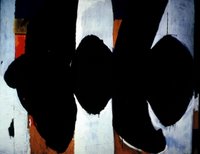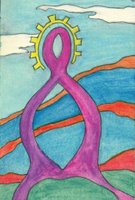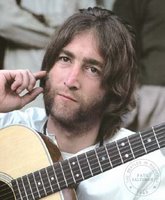One of My Favorite Things
 When assessing the past year of my life, I like to itemize the good, bad, painful, insignificant, difficult, etc. Those are crass classifications, and over simplified categories, but they make it easy when trying to write about the past.
When assessing the past year of my life, I like to itemize the good, bad, painful, insignificant, difficult, etc. Those are crass classifications, and over simplified categories, but they make it easy when trying to write about the past.
Today, I'd like to focus on my favorite things. In no particular order, they are: food, especially when shared with friends; music, especially popular music, female vocalists, jazz from the 30's, 40's, ad 50's, blues, blue grass, 60's and 70's rock'n'roll, and the classical music of Phillip Glass; Frankye, with whom I share my life and home; singing; my home and art studio; my dogs; the close network of friends I have developed; my sister, always a favorite; and then there's ART.
I have to capitalize ART because for the past 30+ years art has played a large role in my life. When I first got sober I didn't know what to do with myself. A big chunk of my life had been taken up with partying, going to clubs (7 nights a week), and socializing around booze with other boozers. Sobriety is about changing people, places and things that you did while you were drinking.
I spoke up at an AA meeting about not knowing what to do with myself anymore and being afraid I would relapse out of sheer boredom. I needed something in my life. A friend approached me after the meeting and invited me to attend an art class she was taking at a local art studio. The teacher was artist John Oliver Brown. I knew when she said it that it was what I was looking for. I had always made pictures. When I was a child anything to do with art facinated me and held my attention. I attended the class, met John, liked him, and studied with him for two years. Making and looking at art has been a cornerstone of my life since then.
There are artists that inspire me and have for decades now. Many artists have caught my attention, some for long periods of time, some for moments. The masters of modern art: Picasso, van Gogh, Cezanne, Klee, Gaughin, O'Keeffe have all amazed and inspired me. Then there are the artists who I consider my favorites. These artists continue to be an important influence and inpiration on me: Robert Motherwell, Susan Rothenberg, Francesco Clemente, Julian Schnabel, Elizabeth Murray, Arthur Dove, Richard Diebenkorn, and (in my opinion) America's greatest living artist, Brice Marden. Newly discovered artist, Nathan Oliveira's work resonates within me as well.
How have these artists been able to captivate me for so long? That's a hard question to answer. All I know is that when I stand before a work of one of these artists I have a physical, emotional and intellectual reaction. 
Two times in my life I have wept when viewing a painting. The first time was when I saw van Gogh's "Starry Night" at the Museum of Modern Art in New York. The painting is not large. It's framed behind glass, something that surprised me. Looking at each brushstroke sent shivers down my spine and I found myself weeping quietly. The other time I wept was at an exhibit of Elizabeth Murray's work. There is something about her shapes and paintings that just move me.
My reaction to Schnabel's work is different. I am amazed by his energy, his chutzpah, and the vast expanse of his work. My reaction is as wide as his range. He's not an artist you can pigeonhole. He doesn't recycle one idea over and over. He can also piss me off more than any other artist I've seen. I always have a strong reaction to his work, excitement, anger, revulsion, awe.
Two artists, in particular, stir me deep, deep inside. They are Robert Motherwell and Brice Marden. Both of these artists have an intellectual as well as spiritual foundation to their work. They have honed self-expression to it's barest and most poignant point. It is not the substancelessness of minimalism (except Marden's early work), but it is expressive and deep, in the way a pebble dropped in a pond lives in the ripples it creates. Their paintings are like that for me. I keep going back to them, standing before them, watching the ripples; they never fail to resonate.
I could write something of each of the artists I've mentioned but then this blog would be too long. Dove, Rothenberg, Diebenkorn, Clemente and Oliveira are wonderful painters. I enjoy their paintings, am impressed by their painterliness and stirred by their work as well.
I've linked a website to each of their names. If you google their names and then click on images a horde of pictures from each artist will come up. Check out some of the pictures. I think you, too, will be impressed.
----------
Brice Marden, Attendant 5, 1996-99, oil on linen, 82"x57"
Robert Motherwell, Elegy to the Spanish Republic 34, 1953-54, oil on canvas, 6'8"x8'4"










 December. It is a time of anniversaries and birthdays. The 5th is my father's birthday. The 6th and 9th are my favorite uncle's and brother-in-law's birthdays. The 8th is the anniversary of the murder of John Lennon. The 10th is the wedding anniversary of my parents. The 24th is my cousin Maryann's birthday and the date of our annual Christmas eve dinner for family. The 25th is a day off work.
December. It is a time of anniversaries and birthdays. The 5th is my father's birthday. The 6th and 9th are my favorite uncle's and brother-in-law's birthdays. The 8th is the anniversary of the murder of John Lennon. The 10th is the wedding anniversary of my parents. The 24th is my cousin Maryann's birthday and the date of our annual Christmas eve dinner for family. The 25th is a day off work.




